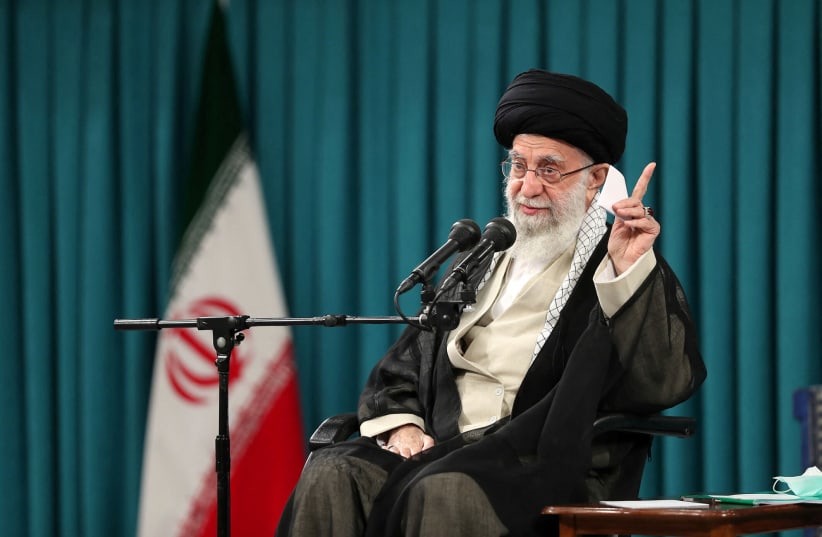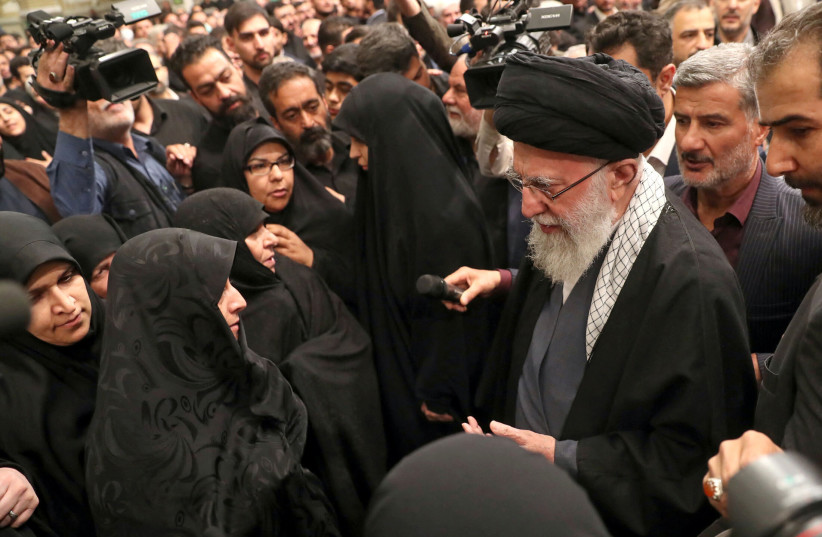Looking into the dark reign of Seyyed Ali Khamenei

Iran
For over three decades, Seyyed Ali Hosseini Khamenei’s rule has profoundly shaped Iran, casting a shadow that evokes the darkest periods of its storied past. His leadership, often compared to that of the oppressive Fath-Ali Shah Qajar (who reigned from 1797-1834 and brought the country to the verge of governmental disintegration), has been marked by severe autocracy and extensive repressive measures that have throttled the nation’s progress and potential. Under Khamenei’s iron-fisted governance, Iran has not only receded in terms of political freedom and social justice but also regressed to a state of deep international isolation.
This era, characterized by its stringent crackdowns on dissent and aggressive foreign policy stances, has mirrored the decline witnessed under some of the Qajar dynasty’s most despotic rulers, embedding a legacy of stifled innovation and eroded civil liberties. Khamenei’s tenure has effectively reversed much of the progress Iran once made towards modernization and global integration, plunging the country into a period of economic stagnation and cultural insularity that threatens to undo decades of development.
Under Khamenei, Iran has experienced an alarming intensification of state control and a severe curtailment of personal freedom, unmatched in its modern history. Governing by a mix of ignorance and superstition, Khamenei’s regime harkens back to historical epochs characterized by stagnation and authoritarian excess.
His leadership has systematically undermined the judiciary’s independence and flouted the rule of law, leading to a socio-political environment steeped in corruption and inefficiency. This relentless pursuit of maintaining power at all costs has precipitated not only economic mismanagement but also significant environmental degradation, undermining the country’s natural resources and public health.
Moreover, under Khamenei’s watch, critical infrastructure has deteriorated, leaving essential services in disrepair and exacerbating the hardships faced by ordinary Iranians. The regime’s policies have prioritized ideological conformity and regime stability over economic rationality and environmental stewardship, resulting in widespread economic disparities and ecological crises.

Iran’s Supreme Leader, Ayatollah Ali Khamenei, meets with the family of one of the members of the Islamic Revolutionary Guard Corps who were killed in the Israeli airstrike on the Iranian embassy complex in the Syrian capital Damascus, during a funeral ceremony in Tehran, Iran April 4, 2024. (credit: Office of the Iranian Supreme Leader/WANA (West Asia News Agency)/Handout via REUTERS)
Iran’s Supreme Leader, Ayatollah Ali Khamenei, meets with the family of one of the members of the Islamic Revolutionary Guard Corps who were killed in the Israeli airstrike on the Iranian embassy complex in the Syrian capital Damascus, during a funeral ceremony in Tehran, Iran April 4, 2024. (credit: Office of the Iranian Supreme Leader/WANA (West Asia News Agency)/Handout via REUTERS)
This legacy of despotism and decay has not only isolated Iran on the global stage but also deeply alienated the regime from its own people, setting the stage for ongoing social unrest and potential upheaval.
Utilizing state propaganda
THE KHAMENEI regime has adeptly utilized state propaganda to vilify its predecessors and mask its own failures, thereby attempting to shape public perception. By systematically demonizing the Pahlavi dynasty and other historical figures, the regime strives to redirect public dissatisfaction away from its current mismanagement and toward a contrived enemy of the past. This narrative construction portrays Khamenei’s leadership as a necessary bastion of stability and moral governance in a landscape supposedly fraught with the chaos of previous administrations.
However, this strategy has begun to backfire significantly. A growing number of Iranians, particularly among the younger generation, are beginning to question the narrative fed to them through official channels. The Internet and global connectivity have exposed them to alternative perspectives of history and contemporary governance, fostering a sense of nostalgia for what they perceive as more progressive and less repressive times before Khamenei’s rise to power.
As dissatisfaction with economic conditions, social restrictions, and political oppression increases, the youth in particular are disillusioned with the stagnation and decline of the regime. This disconnect between its portrayal of the past and the people’s lived experiences is eroding the effectiveness of its propaganda, setting the stage for increased societal tension and potential demands for significant change.
THE TRUE cost of Khamenei’s rule is starkly evident in the extensive suffering endured by the Iranian populace. His regime’s relentless crackdowns on any form of dissent have led to egregious human rights violations. From the brutal suppression of the Green Movement in 2009 to the fierce crackdowns on the nationwide protests in recent years, Khamenei’s government has consistently demonstrated a flagrant disregard for human life and liberty.
Under his directive, the judiciary, which has effectively become an arm of the regime, routinely hands down harsh punishments without fair trial procedures, often resulting in long imprisonments or even executions for those who dare to voice opposition.
Iranian prisons have become notorious for their dire conditions and are overflowing with political prisoners, journalists, activists, and even ordinary citizens caught in the regime’s broad sweeps.
Under Khamenei’s stewardship, Iran has seen a precipitous decline, with its economy caught in a downward spiral exacerbated by systemic corruption and gross mismanagement. While international sanctions have certainly strained the economy, much of the damage can be attributed directly to the regime’s own policies.
The government has consistently prioritized military expenditures and the funding of proxy wars over critical domestic needs such as healthcare, education, and infrastructure. This misallocation of resources has not only stifled economic growth but has also left the Iranian infrastructure in shambles.
Moreover, Khamenei’s policies have wreaked havoc on the environment, leading to acute water shortages, severe air and water pollution, and land degradation which threaten country’s agricultural sector and food security. These environmental issues have compounded the economic hardships faced by the Iranian people, making daily survival increasingly difficult. The regime’s failure to address these pressing issues, combined with its repressive governance, has only fueled discontent and despair among the citizens, setting the stage for ongoing social unrest and further destabilizing the country.
Khamenei’s foreign policy has significantly alienated Iran from much of the international community. His unwavering support for proxy wars across the Middle East and the Islamic Republic’s assertive military posturing in strategic international waters, such as the Strait of Hormuz, have led to escalating tensions with global powers. These actions have provoked a series of international sanctions and deepened Iran’s diplomatic isolation.
Consequently, Iran has been painted as a pariah state, with diminished opportunities for economic development and strained diplomatic relations.
This isolation is self-perpetuating, as it reinforces the regime’s narrative of external threats, which it uses to justify its stringent domestic policies and continued military expenditures. The lack of robust global partnerships not only hampers Iran’s economic prospects but also limits its diplomatic maneuverability, contributing further to its international seclusion.
AS KHAMENEI ages, the looming question of succession intensifies the uncertainty enveloping Iran’s future. The potential for his son, Mojtaba Khamenei, to succeed him raises significant concerns for those within and outside Iran who are hoping for a shift towards reform and openness.
Mojtaba, seen by many as potentially more hardline than his father, may continue – or even intensify – the current regime’s repressive policies.
This prospect heightens fears of sustained authoritarianism, which could stifle any hopes for democratic progress or a softening of foreign policy. The potential transition of power is fraught with the possibility of internal conflict and strife, as various factions within the government and military vie for influence. Such a scenario suggests that the regime’s downfall, whether it happens soon or in the more distant future, could be both chaotic and marked by violence, potentially plunging the country into a deeper crisis.
The dark era of Khamenei’s rule will likely be recorded as a period marked by severe repression, profound economic hardship, and intense social unrest. His legacy will be that of a ruler who drastically curtailed personal freedoms and led his nation toward ruin, all under the guise of religious and ideological righteousness.
As Iran teeters on the brink of potential upheaval, both the Iranian populace and the international community watch closely, hoping for a transition that will bring about a government that respects human rights and the dignity of its people.
The path toward recovery and reform is undoubtedly long and laden with obstacles; however, it remains a crucial and necessary journey to restore Iran to a state of peace, prosperity, and international respect.
This journey will not only require domestic commitment but also international support to help Iran reintegrate into the global community, fostering a future where the country can achieve its rich potential unhampered by oppressive governance.
The writer is a counterterrorism analyst and Middle East studies researcher based in Washington, with a particular focus on Iran and ethnic conflicts in the region. His new book is The Black Shabbat, published in the US. You can follow him at erfanfard.com and on X @EQFARD.
